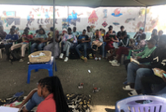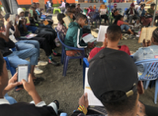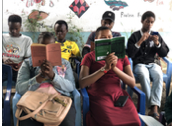by Rose Mwanri 🇹🇿 🏆 Proverb Essay Contest 🥈 Second Place Winner

Savings don't rot
Related Posts
Don't count your chickens before they hatch means that you shouldn't depend on a favorable outcome until it is certain. You shouldn't assume that all your eggs will hatch into healthy chicks and grow into chickens. Do you have a story about this proverb? Share below!
The first written record of this common English proverb is a sonnet written in 1570 by Thomas Howell:
“Count not thy Chickens that unhatched be,
Weigh words as wind, till thou find certainty ”
Many languages have proverbs that convey a similar principle.
Swahili:
“Tujivune hatimaye. ”
Let's praise ourselves at the end.
French:
“Il ne faut pas vendre la peau de l’ours avant de l’avoir tué.”
Don't sell the skin of the bear before killing it.
Arabic:
“لا تشتري السمك وهو في البحر بل انتظر حتى يصطاد”
Do not buy a fish while it is in the sea; wait until it is caught.
German:
“Man soll den Tag nicht vor dem Abend loben.”
Don't praise the day before the evening.
Latin:
“Ante victoriam ne canas triumphum”
Don't...
Read more...This picture was created using AI. What do you think? What picture do you think would best illustrate this proverb?
Methali hii ina maanisha hupaswi kutegemea matokeo mazuri kabla hayajatokea. Hupaswi kutegemea mayai yako yote yatakuwa vifaranga wenye afya nzuri. Je, una hadithi kuhusu methali hii? Toeni maoni!
Rekodi ya kwanza iliyoandikwa ya methali hii ya Kiingereza ni shairi iliyoandikwa mwaka wa 1570 na Thomas Howell:
“Usiwahesabu kuku wako ambao hawajaanguliwa,
Pima maneno kama upepo, hadi upate uhakika”
Lugha nyingi zina methali zinazofundisha kanuni karibu na hii. Mifano:
Kiswahili:
“Tujivune hatimaye.”
Kifaransa:
“Il ne faut pas vendre la peau de l'ours avant de l'avoir tué.”
Usiuze ngozi ya dubu kabla ya kumuua.
Kiarabu:
“لا تشتري السمك وهو في البحر بل انتظر حتى يصطاد”
Usinunue samaki yumo baharini; subiri hadi itakapokamatwa.
Kijerumani:
“Man soll den Tag nicht vor dem Abend loben.”
Usisifu siku moja kabla ya jioni.
Kilatini:
“Ante victoram ne canas triumphum”
Usiimbe shangwe kabla ya ushindi.
Kireno:
“Não conte com o ovo dentro da galinha.”
Usihesabu yai ndani ya kuku.
Picha hii ilichorwa kwa kutumia Akili Bandia (AI). Mnafikiriaje? Toeni maoni!
This Russian Proverb was quoted by Pushkin in the novel "The Daughter of the Commandant":
“My parents gave me their blessing, and my father said to me—
"Good-bye, Petr'; serve faithfully he to whom you have sworn fidelity; obey your superiors; do not seek for favours; do not struggle after active service, but do not refuse it either, and remember the
proverb, 'Take care of your coat while it is new, and of your honour while it is young.'"
My mother tearfully begged me not to neglect my health.”
“When life gives you lemons, make lemonade” means that we should try to make the best out of difficult situations. Lemons are sour and bitter on their own, but by adding sugar and water turns sour lemons into a sweet refreshing drink. When life presents difficulties and challenges (lemons), we can be creative, resilient and flexible to transform these challenges into opportunities (lemonade).
Do you have a story about a time you turned a challenge into an opportunity? Do you know any other sayings that relate to the same principle? Comment below!
Here are some similar sayings from other cultures:
“The impediment to action advances action. What stands in the way becomes the way.”
- Meditations by Marcus Aurelius
“ اِصْنَعْ شَرَابًا حَلُّوا مِنْ حَامِض لَيْمُون الْحَيَاةِ.”
“Make a sweet drink from the acid of the lemon of life. ”
-Arabic Proverb
“जब भी जीवन में मुश्किलें आएँ तो उनका भी लाभ उठाएँ”
“When difficulties come into life, take advantage of them too. ”
-Hindi...
Read more...This picture was created using AI. What do you think? What picture do you think would best illustrate this proverb?
"Maisha yakikupa limao, tengeneza juis" inamaanisha pale tunapokutana na changamoto, tunapaswa kujaribu kuzifanyia kazi ili zibadilike kuwa fursa. Limao pekee ni chungu, lakini sukara na maji safi hugeuza limao chungu kuwa kinywaji kitamu cha kuburudisha. Maisha yanapoleta chungu na changamoto (limao), tunaweza kuwa wabunifu na wastahimilivu ili kubadilisha changamoto hizi kuwa fursa (juis).
Je, umewahi kubadilisha changamoto kuwa fursa?
Je! unajua misemo au mithani inayohusiana na kanuni hiyo hiyo?
Toeni maoni hapa chini!
Misemo inayohusiana kutoka kwa tamaduni mbalimbali:
Kizuizi cha hatua huendeleza hatua. Kinachosimama njiani kinakuwa njia.
- Tafakari za Marcus Aurelius (Roma ya Kale)
“اِصْنَعْ شَرَابًا حَلُّوا مِنْ حَامِض لَيْمُون الْحَيَاةِ”
“Tengeneza kinywaji kitamu kutoka kwa asidi ya limau ya maisha.”
-Methali ya Kiarabu
“जब भी जीवन में मुश्किलें आएँ तो उनका भी लाभ उठाएँ
Matatizo yanapotokea, tumia fursa hiyo pia. ”
-Methali ya Kihindi
(Chanzo: Shukrani kwa...
Read more...Picha hii iliundwa kwa kutumia Akili Bandia. Unafikiriaje? Je, picha gani ingefafanua methali hii vyema?
Today's proverb "Haraka haraka haina baraka" literally translates to "Hurry hurry has no blessing"... but that doesn't rhyme, so we decided to go with "Haste makes waste." Which translation do you like better? Have you ever rushed through something and regretted it later? Comment below...
I see two possible interpretations of this proverb (in Swahili):
1. Patience: Hurry causes us to make mistakes, and those mistakes cause us to miss out on potential blessings.
2. Mindfulness: When we're in a hurry, we don't have time to notice or enjoy the blessings we have.
What do you think? What's your interpretation?
Similar saying are common around the world:
Spanish:
“No por mucho madrugar amanece más temprano
(Waking up early doesn't make the sun rise any sooner)”
Chinese:
“欲速则不达
(Haste makes waste)”
From the Sayings of Confucius (Analects, 13:17, page 92)
“When Tsz-hiá became governor of Kü-fu, and consulted him about government, he answered, "Do not wish for speedy results. Do...
Methali ya leo ni "Haraka haraka haina baraka." Tafsiri yake kwa Kiingereza ni "Haste makes waste" au "Hurry hurry has no blessing" Mnaonaje - tafsiri ipi bora? Toeni maoni chini...
Kwa upande wangu naona kwa mitazamo miwili. Methali hii inaweza kutufundisha:
1. Subira: Haraka husababisha makosa, na makosa hutuzuia baraka. (Nenda taratibu)
2. Mindfulness (yaani uwepo kiakili na utulivu): Tunapopoenda kwa haraka, hakuna muda wa kutambua, kutumia au kufurahia baraka tulizo nazo.
Kuna misemo karibu na "haraka haraka haina baraka" katika nchi nyingi. Mifano:
Kihispania:
“No por mucho madrugar amanece más temprano
(Kuamka mapema hakufanyi jua kuchomoza mapema)”
Kifaransa:
“Tout vient a point a qui sait attendre
(Everything comes to those who wait)”
Kiswahili:
“ Pole pole ndio mwendo ”
Kichina:
“欲速则不达”
Methali hii ya Kichina ni karibu na "Haraka haraka haina baraka". Inatoka kitabu cha Misemo ya Konfusio (Analects, 13:17, ona ukurasa wa 92):
“Tsz-hiá alipokuwa Mkuu wa Mkoa wa...
Today's proverb comes from the Ancient Greek myth of Icarus... and we wrote a short picture book about the story!
Download now:
Don't Fly Too Close to the Sun
"Don't fly too close to the sun" is a warning against hubris (excessive pride). The proverb teaches us that pride and ambition should be balanced with caution, humility and good advice.
For example, imagine a young entrepreneur. She launches her first product and has immediate success. Encouraged, she starts making more and more ambitious plans. She decides to take out a large loan from the bank in order to launch more products and buy property. But the sales growth she was expecting does not materialize, and she finds herself falling behind on the loan payments. In the end, the business sinks deeper and deeper into debt and can't recover. If she had steered a "middle path," building on her success with small, moderate steps, and listening to her mentors, things might have ended differently.
We can apply this proverb in...
Read more...Methali ya leo inatoka katika hadithi ya Ugiriki ya Kale ya Ikarus ... na tuliwaandikia kitabu kifupi cha picha kuhusu hadithi ya Ikarus...
Soma sasa:
Usiruke Karibu Sana na Jua
"Usiruke karibu sana na jua" ni onyo dhidi ya kiburi. Methali hii inatufundisha kwamba kiburi na tamaa vinaweza kuleta madhara mabaya ukipuuza tahadhari, unyenyekevu na ushauri mzuri.
Kwa mfano, fikiria mjasiriamali mdogo. Anazindua bidhaa yake ya kwanza na anapata mafanikio ya haraka. Akiwa ametiwa moyo, anaanza kuweka mipango kabambe zaidi na zaidi. Anaamua kuomba mkopo mkubwa wa benki ili kuzindua bidhaa zaidi na kununua vifaa, mali na ardhi. Lakini ukuaji wa mauzo aliokuwa akitarajia haujitokezi, na anajikuta akichelewa na malipo ya mkopo. Hatimaye, biashara inazidi kuzama kwenye deni. Angeenda "njia ya kati," yaani kujenga mafanikio yake kwa hatua nyingi ndogo, na kusikiliza maonyo ya washauri wake, mambo yangeenda vizuri zaidi.
Tunaweza kutumia methali hii katika maisha yetu ya kila siku kwa...
Read more...Today's proverb means that people who are excessively proud are likely to fail. Success can make us overconfident, causing mistakes. Pride and ego can also blind us to our limitations and prevent us from seeing reality clearly.
On the other hand, in the modern world, many people see confidence and self-esteem as positive virtues. What is the difference between healthy and unhealthy pride? Share your thoughts below!
This proverb is often associated with the story of Icarus, from Greek mythology. (Spoiler alert for those who haven't check out our new picture book, "Don't Fly Too Close to the Sun"). Icarus was given wings made of feathers and wax by his father, Daedalus. He was warned not to fly too close to the sun, but Icarus ignored his father’s advice, proudly flying higher and higher. The sun melted the wax, and Icarus fell into the sea and drowned.
Just before the Titanic's maiden voyage the company's leader, Phillip Franklin, wrote:
“There is no danger that Titanic will...
Image from the painting by Caspar David Friedrich, 1817, "Wanderer above the Sea of Fog / Der Wanderer über dem Nebelmeer"























